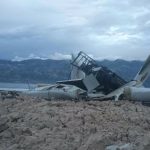Strangely enough, wildfires on Pag helped the farmers fight two natural enemies of their sheep
Here’s the weird fact of the day: when multiple locations in Dalmatia caught fire a couple of weeks ago, and every available fireman was seen as a priceless adition to the overall firefighting efforts, farmers of Pag island weren’t that happy to see the fire brigade arrive.
When wildfires broke out at the southeast part of the island – the area of Šepovci, Šegute, Sv. Martin and Košljun above Zaglava – multiple fire departments from Pag, Povljana, Kolana and Novalja sent their men into the field. Once they arrived on site, they were intercepted by the local land owners, reported Agroklub.
“Why are you here? Feel free to go away”, the locals told the stupefied firefighters. It was not exactly clear why anyone would want to stand aside and watch their land ablaze – most of the undergrowth and the purposely planted pine forest burned down; the farmers suffered major damage at their olive groves. However, along with all the crops, the wildfires ravaged vast batches of savin juniper, a plant that’s been rapidly spreading around the island for decades now.
Savin juniper, called sobina in Croatian, has been the cause of headache for all the farmers on Pag since it appeared in the 80s. The island is now covered in invasive shrubs that destroyed Pag’s natural vegetation: pastures of sage and other medicinal herbs, also known as the menu preferred by the local sheep, have considerably decreased in size. The herds have nothing to feed on, and all the sheep farmers on the island have been desperate for quite some time. As the competent institutions haven’t offered any significant help, the farmers welcomed the wildfire with open arms – if nothing else, at least the despised plant will burn down.
There’s more – it’s not just about the plant. Another big problem the farmers of Pag are facing is the unmanageable population of jackals. According to sheep farmer Ivan Gligora, the jackals have been slaughtering sheep all over the island since the first specimen found their way to Pag. They’ve reproduced so much, more than 200 sheep and lambs fall victim to the jackals each year. Unlike wolves, jackals are not a protected species in Croatia, so the farmers don’t get any compensation for their losses. No matter how hard they try, including the hunts organised by the local hunters’ associations, sheep farmers of Pag can’t do anything to reduce the number of predators on their own.
It turns out, no matter how morbid it may seem, the only thing that helped so far… was the fire.








